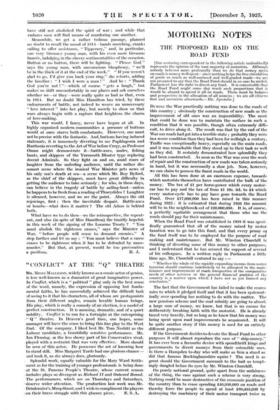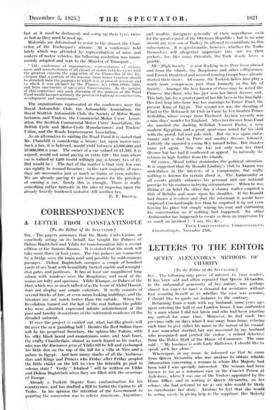MOTORING NOTES
THE PROPOSED RAID ON THE ROAD FUND
[Our motoring correspondent in the following article undoubtedly represents the opinion of the vast majority of motorists. Although nobody believes more profoundly than we do that money spent on roads is money well spent—since nothing helps the free circulation of goods so much as- wall-surfaced and well-graded roads—we. are not prepared to say that the Road Fund should in no case be raided. Parliament his the right to•divert any fund. It is conceivable that the Road Fund might some day reach such proportions that it would be absurd to spend it all on roads. There must be balance, and perspective in the allocation of all moneys ; we are all citizens first and motorists afterwards.—En. Spectator.] DURING the War practically nothing was done to the roads of this country ; obviously the construction of new roads or the improvement of old ones was an impossibility; The most that could be done was to maintain the surface in such a
condition that it was possible, though often extremely dif&-- • cult, to drive along it. The result was that by the end of the War our roads had got into a terrible state ; probably they were in a worse condition than they had been for wellnigh a century.
Traffic was exceptionally heavy, especially on the main roads, and it was remarkable that they stood up to their task as well as they did. It certainly demonstrated how splendidly they had been constructed. As soon as the War was over the work of repair and the construction of new roads was taken seriously in hand, but it was necessarily a slow job. Now, however, we can claim- to possess the finest roads in the world.
All this has been done at an enormous expense, towards which motorists themselves have contributed the bulk of the money. The tax of £1 per horse-power which every motor- car has to pay and the tax of from £1 10s. Od. to 24 which every motor-cycle has to pay have gone towards the Road Fund. Over £17,000,000 has been raised in this manner during 1925: it is estimated that during 1926 the amount will be in the neighboinh cod of £20,000,000. It is, of course, a perfectly equitable arrangement that those who use the roads should pay for their maintenance.
When the Road Fund was established in 1909 it was speci- fically guaranteed that all of the money raised by motor taxation was to go into this fund, and that every penny oi the fund itself was to be employed for the purpose of road making and maintenance. But Mr. Winston Churchill is thinking of diverting some of this money to other purposes, and I understand that he has secured the support of several of his colleagues. In a written reply in Parliament a little time ago, Mr. Churchill ventured to say :- "Whether the whole of the rapidly expanding income from motor taxation should continue indefinitely to be allocated to the main- tenance and improvement of roads irrespective of the comparative needs of other services or the general financial position of the . country is a matter upon which I have not as yet formed any conclusion."
The fact that the Government has failed to make the econo- mies to which it pledged itself and that it has been systemat- ically over spending has nothing to do with the matter. The new pensions scheme and the coal subsidy are going to absorb a large sum of money, we know, but that is no excuse for deliberately breaking faith with the motorist. He is already taxed very heavily, but so long as he knew that his money was being spent upon road improvements he acquiesced. It will be quite another story if this money is used for an entirely different purpose. , If the Government decides to devote the Road Fund to other purposes it will almost reproduce the case of " ship-money." It has ever been a favourite device with spendthrift kings and governments to divert moneys from their ostensible uses. Is there a Hampden to-day who will make as firm a stand as did that famous Buckinghamshire squire ? The need is as great should the Government succumb to the bait so tempt- ingly dangled before its eyes by Mr. Winston Churchill.
On purely national ground, quite apart from the unfairness of the thing, the ease against such a scheme is very strong. Nothing could be more destructive of the economic position of • the country than to cease spending SA-0,000,000 on roads and thereby force the people to spend at least £80,000,000 by destroying the machinery of their motor transport twice as fast as it need be destroyed, and using up their tyres twice as fast as they need be used up.
Motorists are determined to resist to the utmost the Chan- cellor of the Exchequer's scheme. At a conference held lately which was attended by representatives of users and makers of motor vehicles, the following resolution was unani- mously adopted and sent to the Minister of Transport : --
"lid: conference of organizations representative of owners, users and manufacturers of all classes of motor vehicles views with the greatest concern the suggestion of the Chancellor of the Ex- chequer that a portion of the revenue from motor taxation should be diverted from the purposes to which it is at presont devoted, and to which it was pledged by the Finance Act (1909-1910), 1910, and later enactments of successive Governments. In the opinion Of this conference any such diversion of the moneys of the Road
Fund would hamper seriously the process of highway reconstruction, development and maintenance."
The organizations represented at the conference were the Royal Automobile Club, the Automobile Association, the Royal Scottish Automobile Club, the Society of Motor Manu- facturers and Traders, the Commercial Motor Users' Associ- ation, the Scottish Commercial Motor Users' Association, the British Cycle and Motor-Cycle Manufacturers' and Traders' Union, and the Roads Improvement Association.
As an alternative to raiding the Road Fund it is stated that Mr. Churchill is considering .a luxury tax upon motor-cars. Such a tax, it is believed, would yield between £5,000,000 and 26,000,000 a year. The owner of a car valued at £1,500, it is argued, would not mind paying an extra £20 ; the man whose car is valued at £200 would willingly' pay a luxury tax of £1. But would he ? The fact of the matter is that very few cars can rightly be termed luxuries ; in the vast -majority of cases they are -necessaries just as much as trains or even watches. We arc already paying El per horse-power for the privilege of owning• a car. Surely this is enough. There is really something rather fantastic in the idea of imposing upon the already heavily burdened motorist still another tax.
E. T. BROWN.



































































 Previous page
Previous page